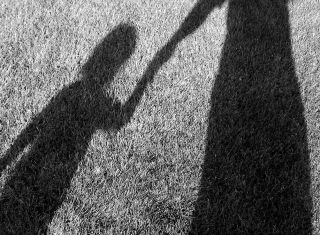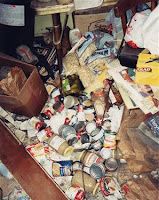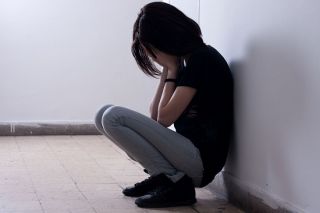
Guilt
Outside of the Wall
The life of children of hoarders--Guest Blog by Rae Smith
Posted September 16, 2012
Have you ever woken up in a cold sweat from that dream where you're standing on one side of a wall while a loved one is on the other side in distress? You scramble at the wall, desperate for something, anything, to grasp and climb your way to the top. The cries on the other side become muffled and disjointed. You're frantic, yet no matter how far you climb, the wall grows higher and higher. It feels so hopeless. You don't exactly know what's happening on the other side, and you're not even sure you want to see it, but if you don't try your loved one will be lost forever.

That's not just a dream for me. That's what it's like to be the daughter of a compulsive hoarder. The wall is real; it might not be made from bricks, stones, and mortar, but it's not moving any time soon. It's comprised of a vast collection of "valuables." In my Mom's house, these valuables look like plastic bags, lost socks, unfinished craft projects, vintage clothing patterns, bits of lace, Christmas decorations, porcelain doll body parts, and pretty much everything ever acquired over the past 15 years. Mom is a compulsive hoarder, and probably a compulsive shopper, too. Her favourite past time is visiting thrift stores, and she gets a real high from scoring a deal. She can't turn down a discount, and she gladly provides a home to all the stuff her friends no longer want. It all ends up at home, in an ever growing pile. There's no floor space. No where to sit, cook, eat, or spend time with a hobby. Every nook and cranny is filled with stuff.
Like most compulsive hoarders, Mom lacks the insight to acknowledge this is a problem. Which, in itself, is the problem. She's totally baffled as to why my sister and I have an issue with her clutter. We once tried to seriously talk to her about how we feared her hoard was affecting her health. With the mold, dust, off-gassing, and lack of air circulation, it HAS to be contributing to her respiratory issues.
She was so angry we dared comment on her "housekeeping skills" she threatened to disown us. She threw every guilt trip at us possible; even the "I-survived-Cancer-and-this-is-how-you-treat-me" card. I was devastated. This was my Mother. We'd always been so close, and easy companions for each other. It wasn't unusual for my sister to be at loggerheads with her, but Mom and I had never quarrelled. I was really hurt she was choosing her stuff over her daughters.

It's now a few years since that blow-out. We haven't had the same relationship since. Where we were once able to talk about anything, our conversations are now superficial. She spends most of our weekly phone call talking about her trip to the thrift store. I bite my tongue when she comments on how she can't afford a minor car repair. I try to ignore it when she tells me she lost something important and can't imagine where it might be. But my heart clenches when she almost casually says how she keeps the house cold during the winter because she can't afford the heating bill; and she takes cold showers because the water heater is broken. She'd never dream of having someone in to service it…a repair person would probably report her.
And yet, she's not concerned. She tells me it's nothing she can't handle and I shouldn't worry about her. Well, I do. I worry her house is so full of stuff it'll collapse under the weight. I worry she has no way of exiting the house in case of fire. I worry she's unable to maintain the functions of her home and suffers because of it. Mostly, I worry she'll fall and hurt herself, and no one will ever know to help her. I fear she'll die alone, surrounded by her stuff instead of her family.
While I can't discuss her hoarding disorder with her, it's pretty much all my sister and I talk about. And that's exhausting and depressing. We struggle to remember Mom as she was before her hoarding habits really took over. We compare the stories and lies she tells us. We commiserate over how difficult it is to have a genuine relationship with the woman who raised us. There are times I can tell my sister just wants to wash her hands of the whole deal…I understand that. We both know we'll have to deal with clearing out the house after Mom dies. It'll come with a load of guilt and grief, not to mention time and money we don't really have. When people finally learn how Mom was living, will they turn to us and ask "why didn't you do more to help her?"
How DO you help someone who doesn't want help? Who is insulted you dare suggest they need help? We're left at a crossroads…do we push the issue to get her house condemned and have her never speak to us again? Or do we wait it out, and try to at least have some connection with her while she's still alive, knowing the hoarding is slowly killing her?
So I continue to climb this wall. It's hard to find a foothold, and my muscles are getting tired. I can barely hear my Mom on the other side anymore…she's muffled and vague. The wall reaches up to the sky, but I've got to keep trying.
Follow Rae Smith's journey on her blog, notjustclutter.com, or at Twitter at @NotJustClutter.
The experience of children of hoarders

Rae is not alone in this experience. Between 2-14% of individuals engage in hoarding, some of whom have children. Many individuals who engage in hoarding do not recognize it as a problem and often it is family members who are distressed by hoarding, not the individual who engages in hoarding. Like Rae's mother, most individuals (nearly 75%) who engage in hoarding, also engage in compulsive buying, spending large portions of their income without the ability to control their purchasing. A little over half of hoarders gather free items, such as lint, trash, bottles, and wrappers. Individuals who engage in hoarding also have difficulty making discriminating between items that should be discarded and those that should be kept, leading to the accrual of large quantities of items within the home. Usually it is considered hoarding if the amount of possessions intereferes in the use of space for the original purpose, as in a kitchen that is so cluttered that it may not be used to cook or eat.
Also, like Rae, many children of individuals who hoard, report a difficult relationship with their parent. Unfortunately, there is virtually no published research on how hoarding impacts family members and therefore little is known about how to help family members in their struggle. Future research is needed in this area before progress may be made. However, children of individuals who hoard are joining together in online communities to provide support to one another and take down the wall of secrecy surrounding hoarding.
For information on hoarding, see Keeping the Clutter.
Resources
If you are the child of a hoarder, here are some resources that may be helpful:
http://childrenofhoarders.com/wordpress/
http://www.notjustclutter.com/



